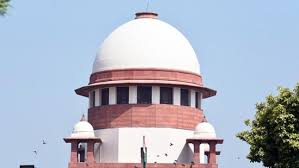The High Court, has through the impugned order, suspended the Appellant’s sentence and granted him bail but the stay on conviction has been declined. (Para 2)
On the very same day, Case Crime No. 1052/2007 was registered under Section 3(1) of the UP Gangsters Act at the Mohammadabad Police Station in the Ghazipur District of Uttar Pradesh (Para 3.2)
The Trial Court held the Appellant guilty under Section 3(1) of the UP Gangsters Act and awarded him a sentence of four years of simple imprisonment, along with a fine of Rs. 1,00,000/- (Rupees One Lakh only). Consequently, Notification No. S.O. 1994 dated 01.05.2023 was published by the Lok Sabha Secretariat in the Gazette of India, disqualifying the Appellant from membership in the Lok Sabha, effective from the date of his conviction on 29.04.2023. (Para 3.4)
In such fact situation, should a convict merely because of his status as a member of the Lok Sabha/Legislative Assembly, particularly when only a few months remain for a new Lok Sabha to be formed, be given special treatment when in ordinary circumstances, such treatment may not be available to the common citizen? The answer to this question, I am inclined to think, is a simple “NO” unless, of course, it is shown that grave injustice and irreversible consequences would follow a refusal by the competent court to stay the conviction. (Dipankar Datta, J. – Para 61)
It has neither been shown from the application filed before the High Court under section 389(1), Cr. PC that the appellant did specifically pray for stay of the conviction nor did I find the same therein; hence, question of the appellant suffering grave injustice and irreversible consequences would have to take a back seat, considering the absence of any such specific prayer. This is the first, though not the foremost, ground for not considering the prayer of the appellant favourably. (Dipankar Datta, J. – Para 62)
The appellant is an accused in a couple of criminal cases and his conduct is either under investigation or he is standing trial. Not a single mitigating factor was shown by the appellant that could lend support to his case. In such circumstances, can it be concluded that the appellant’s case qualifies as “exceptional”, thus justifying a stay of the conviction? (Dipankar Datta, J. – Para 65)
It would not be out of place to quote Dwight D. Eisenhower, the 34th U.S. President, perhaps in times when democracy faced its toughest test. He said: “the clearest way to show what the rule of law means to us in everyday life is to recall what has happened when there is no rule of law”. This serves as an important reminder. Adoption of the course charted by Dr. Singhvi that a mere disqualification (without anything more being on record) should be considered as amounting to “irreversible consequences”, would inevitably result in this Court sailing in an unnavigable sea of generalization where, upon disqualification suffered due to the conviction, a parliamentarian would be entitled to an automatic stay on his conviction without the requisite pleadings. While recognizing the importance of the electorate’s representation, it is necessary to maintain a balance between this right and the enforcement of legal accountability within the democratic framework. (Dipankar Datta, J. – Para 80)
SUPREME COURT OF INDIA
2023 STPL(Web) 480 SC
[2023 INSC 1071]
Afjal Ansari Vs. State Of Up
Criminal Appeal No. 3838 of 2023 (Arising out of Special Leave to Appeal (Crl.) No. 11129 of 2023)-Decided on 14-12-2023
https://stpllaw.in/wp-content/uploads/2024/01/2023-STPLWeb-480-SC.pdf







